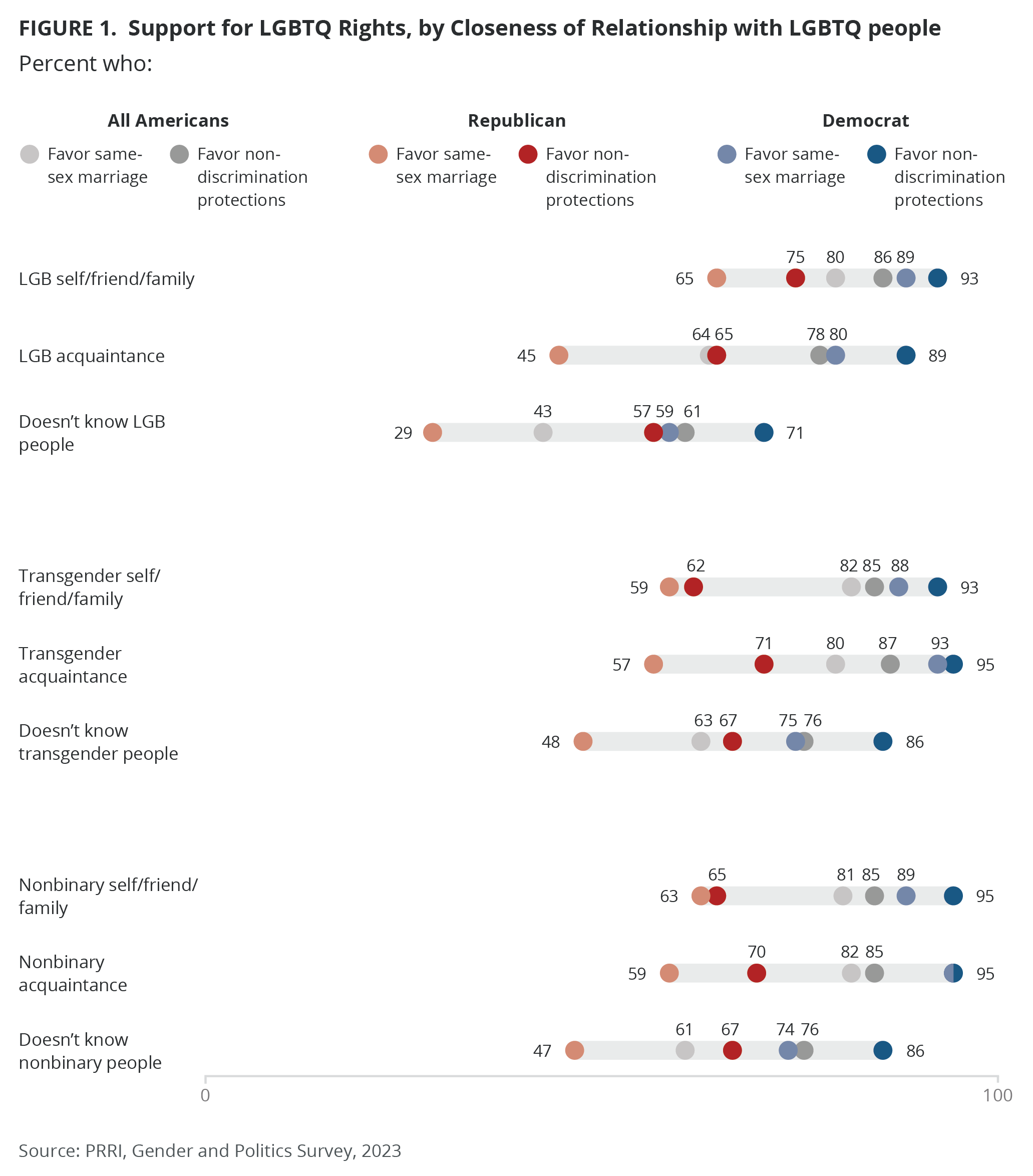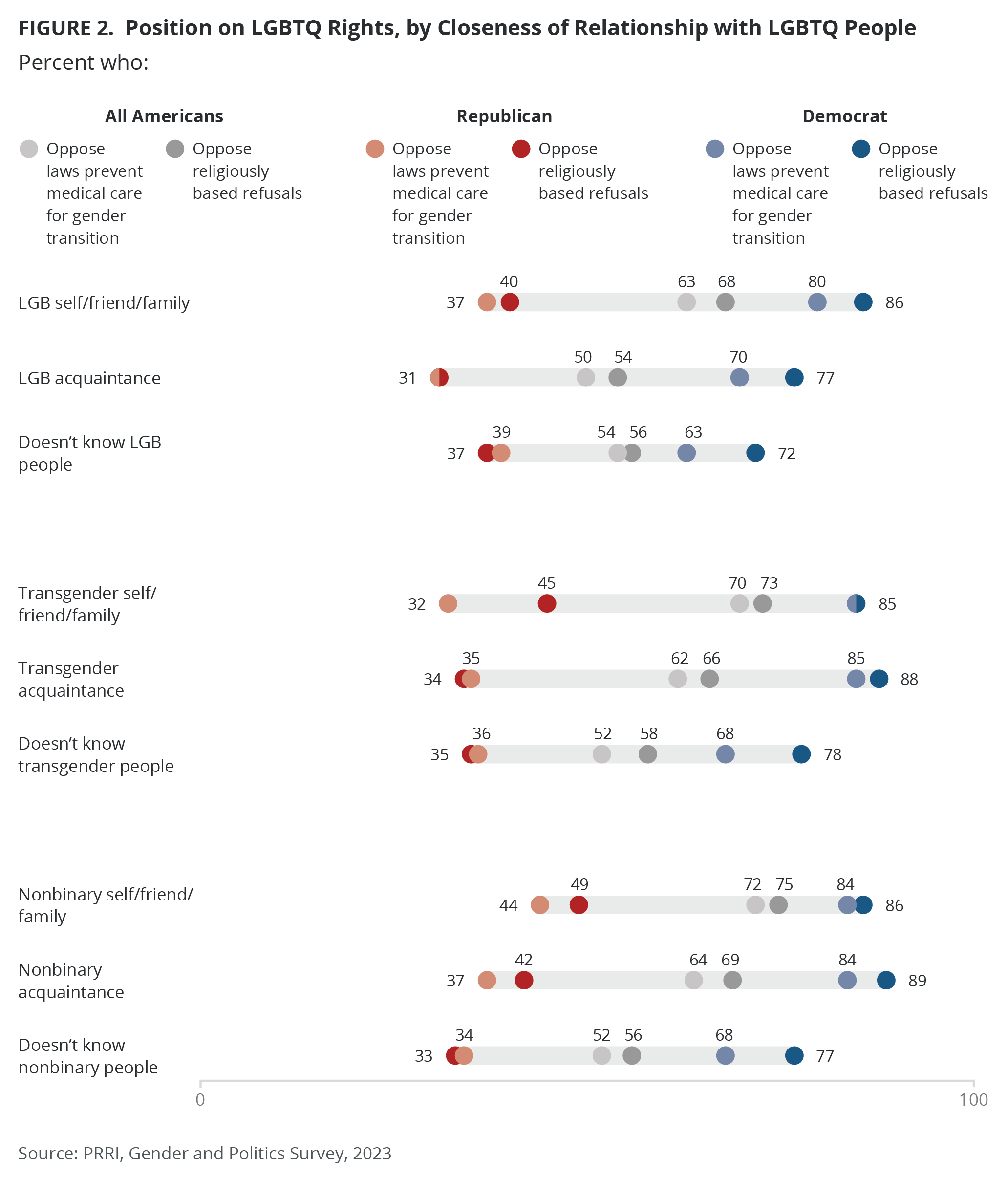PRRI’s 2023 Gender and Politics survey finds that majorities of Americans support LGBTQ rights, including supporting laws that would protect gay, lesbian, bisexual, and transgender people against discrimination in jobs, public accommodations, and housing (79%), supporting allowing gay and lesbian couples to marry legally (69%), opposing allowing small business owners to refuse products or services to gay or lesbian people, if doing so violates their religious beliefs (61%), and opposing laws that prevent parents from allowing their child to receive medical care for a gender transition (56%). However, there are partisan divides among those who have close relationships with LGBTQ people.
When looking at support for policies that advance LGBTQ rights by the strength of a person’s relationship to a member of the LGBTQ community, there are few differences in Republicans’ support for nondiscrimination protections against LGBTQ people between those who have close and weak relationships or do not know any transgender (62% vs. 71% vs. 67%) or nonbinary people (65% vs. 70% vs. 67%). [1]
However, there is a wider gap in support for nondiscrimination protections among Republicans who know someone closely who is LGB (75%), Republicans who have an acquaintance who is LGB (65%), and Republicans who don’t know anyone who is LGB (57%). The same pattern emerges among Republicans who support same-sex marriage. The gap between Republicans’ support for same-sex marriage among those who have close and weak relationships with transgender (59% and 57%, respectively) and nonbinary people (63% and 59%, respectively) or don’t know anyone who is transgender (48%) or nonbinary (47%) is much smaller than the difference among Republicans who say they have close (65%) or weak relationships (45%) with LGB people and Republicans who don’t know any LGB people (29%).
 Republicans are notably less supportive of LGBTQ rights when it comes to religiously based service refusals and access to medical treatment for gender transition. Interestingly, while there is no notable difference in Republicans’ opposition to laws that allow religiously based service refusals and laws that prevent parents from allowing their child to receive medical care for gender transition among Republicans who have a close relationship with LGB people (40% and 37%, respectively) and Republicans who don’t know anyone who is LGB (37% and 39%, respectively), both groups are notably more likely to oppose religiously based refusals and laws that prevent gender transition than those who have an acquaintance who is LGB (31% both).
Republicans are notably less supportive of LGBTQ rights when it comes to religiously based service refusals and access to medical treatment for gender transition. Interestingly, while there is no notable difference in Republicans’ opposition to laws that allow religiously based service refusals and laws that prevent parents from allowing their child to receive medical care for gender transition among Republicans who have a close relationship with LGB people (40% and 37%, respectively) and Republicans who don’t know anyone who is LGB (37% and 39%, respectively), both groups are notably more likely to oppose religiously based refusals and laws that prevent gender transition than those who have an acquaintance who is LGB (31% both).
Surprisingly, there is little difference in opposition to laws that prevent parents from allowing their child to receive medical care for gender transition by closeness of relationships with transgender people among Republicans (32%, 35%, 36%, respectively). However, Republicans who have an acquaintance who is transgender (34%) or don’t know anyone who is transgender (35%) are less likely to oppose allowing religiously based refusals than those who have a close relationship with transgender people (45%). By contrast, the gap in opposition to both religiously based refusals and laws that prevent medical care for gender transition by closeness of relationships with nonbinary people is notably wider among Republicans who have a closer relationship with nonbinary people (49% and 44%, respectively), have an acquaintance who is nonbinary (42% and 37%, respectively), and those who don’t know anyone who is nonbinary (33% and 34%, respectively).
 Regardless of the closeness of relationships with LGBTQ people, at least 7 in 10 Democrats support both non-discrimination legislation for LGBTQ people and same-sex marriage and oppose both laws that allow religiously based refusals and laws that access to prevent medical treatment for gender transition. While Republicans attitudes vary significantly based on different levels of closeness of relationship with members of the LGBTQ community, attitudes among Democrats remain generally supportive of LGBTQ rights.
Regardless of the closeness of relationships with LGBTQ people, at least 7 in 10 Democrats support both non-discrimination legislation for LGBTQ people and same-sex marriage and oppose both laws that allow religiously based refusals and laws that access to prevent medical treatment for gender transition. While Republicans attitudes vary significantly based on different levels of closeness of relationship with members of the LGBTQ community, attitudes among Democrats remain generally supportive of LGBTQ rights.
This Spotlight Analysis is part of a series on Americans’ proximity to the LGBTQ community. Read more:
[1] Weak relationships refer to those who have acquaintances who are members of the LGBTQ community.